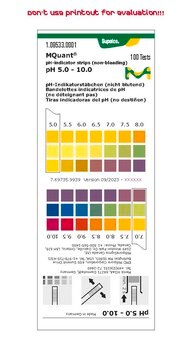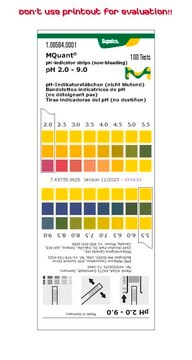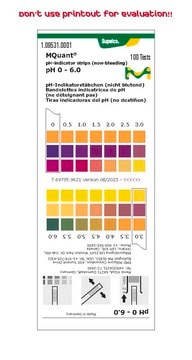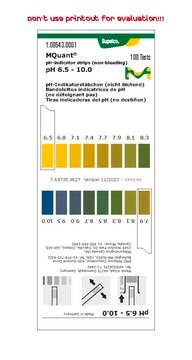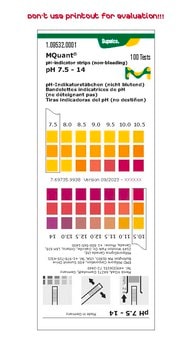P4536
pH test strips
pH 4.5-10.0, resolution: 0.5 pH unit
Iniciar sesiónpara Ver la Fijación de precios por contrato y de la organización
About This Item
UNSPSC Code:
41100000
NACRES:
NB.79
Productos recomendados
feature
non-bleeding: no
refill: no
pH measuring range
4.5-10.0, resolution: 0.5 pH unit
detection method
colorimetric
¿Está buscando productos similares? Visita Guía de comparación de productos
General description
Non-bleeding pH color strips. Simply immerse the strip in the test solution until color development is complete. Then compare the developed color to the sequence chart on the package, and read the pH. The range covered by each type of strip is divided into graduations as given below. Each package contains 100 strips in a clear, plastic container with a snug fitting top.
Elija entre una de las versiones más recientes:
Certificados de análisis (COA)
Lot/Batch Number
Lo sentimos, en este momento no disponemos de COAs para este producto en línea.
Si necesita más asistencia, póngase en contacto con Atención al cliente
¿Ya tiene este producto?
Encuentre la documentación para los productos que ha comprado recientemente en la Biblioteca de documentos.
Cláudia Raposo de Magalhães et al.
BMC genomics, 21(1), 309-309 (2020-04-21)
Aquaculture is a fast-growing industry and therefore welfare and environmental impact have become of utmost importance. Preventing stress associated to common aquaculture practices and optimizing the fish stress response by quantification of the stress level, are important steps towards the
Cláudia Raposo De Magalhães et al.
Food chemistry, 305, 125508-125508 (2019-10-18)
Fish is one of the most common elicitors of food-allergic reactions worldwide. These reactions are triggered by the calcium-binding muscle protein β-parvalbumin, which was shown to have reduced immunoglobulin E (IgE)-binding capacity upon calcium depletion. This work aimed to reduce
Magdalena Szczesny et al.
mBio, 9(4) (2018-08-23)
Biofilms are often described as protective shelters that preserve bacteria from hostile surroundings. However, biofilm bacteria are also exposed to various stresses and need to adjust to the heterogeneous physicochemical conditions prevailing within biofilms. In Gram-negative bacteria, such adaptations can
Nuestro equipo de científicos tiene experiencia en todas las áreas de investigación: Ciencias de la vida, Ciencia de los materiales, Síntesis química, Cromatografía, Analítica y muchas otras.
Póngase en contacto con el Servicio técnico
